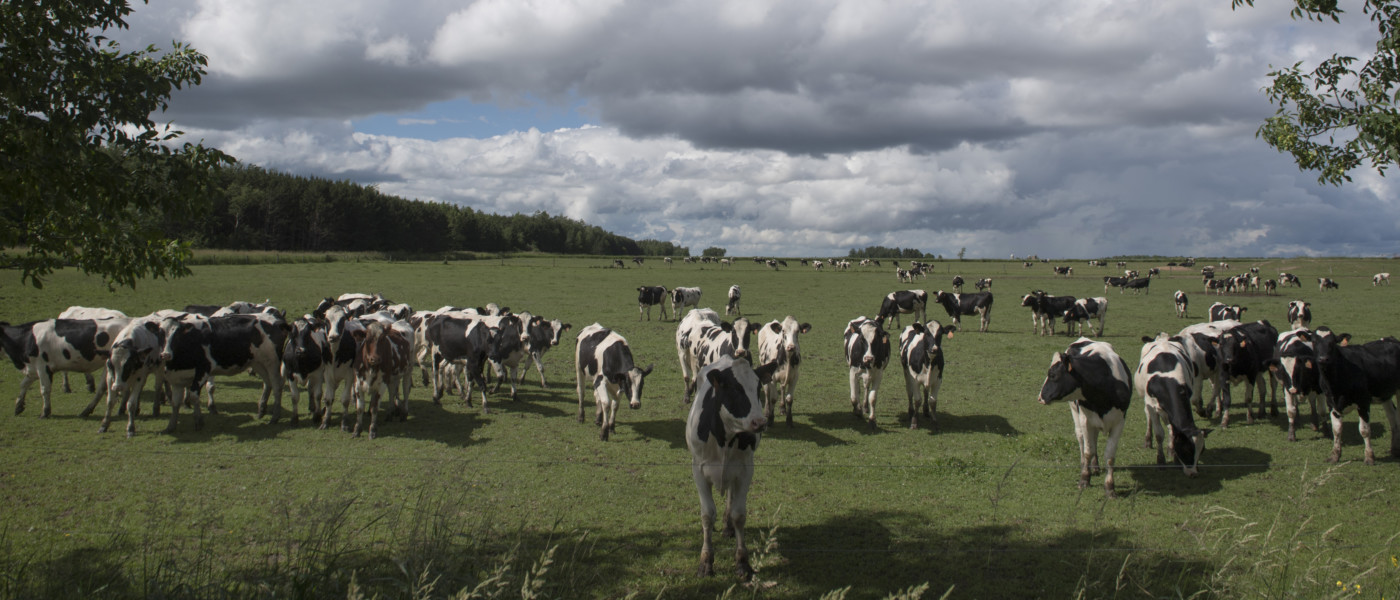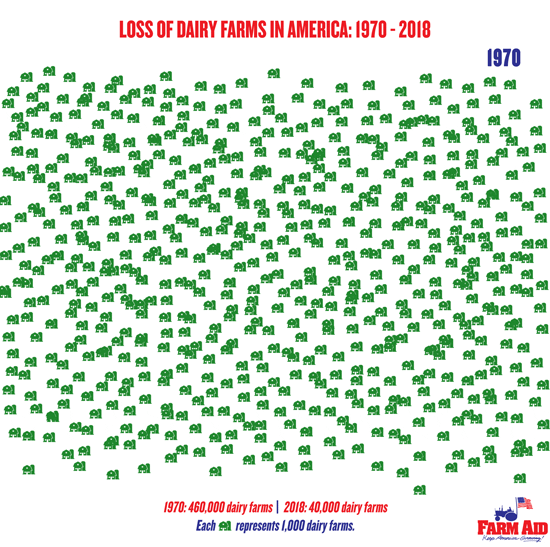In the days after the Farm Aid festival, we’re gratified to hear stories about what it meant to family farmers to see themselves celebrated on the big stage. We love to hear about new connections between festivalgoers; the fun they had; the good food they enjoyed.
Just a week after this year’s festival concluded, we received an interesting note from our friends at Wisconsin Farmers Union: “Last week in Wisconsin,” it began, “we had abundant appreciation for family farms from Farm Aid. Your affirmation and respect was so appreciated…And today, in contrast, this is what we get from Secretary Perdue…”
They were, of course, referencing Secretary of Agriculture Sonny Perdue’s remarks at the World Dairy Expo in Madison last week. “In America, the big get bigger and the small go out,” Perdue said to a community reeling from low milk prices, dramatic farm losses and rising suicide rates. This followed an ill-conceived joke just a few weeks prior to a Minnesota farm audience: “What do you call two farmers in a basement? A whine cellar.”
We are appalled, as every American should be, by this callous treatment and disrespect of farmers. But we’d have to have a serious case of amnesia to be surprised.
Déjà Vu All Over Again
In the 1970s, Nixon’s Secretary of Agriculture Earl Butz infamously told farmers to “get big or get out.” Farmers followed this directive, expanding their operations, overleveraging their assets and taking on massive amounts of debt. The government dismantled New Deal era policies that delivered fair prices to farmers and better matched supply with demand because export markets and high productivity were supposedly going to make up the difference when the prices for farm goods dropped.
But a U.S. grain embargo on the Soviet Union contracted export demand, the prices for farm goods took a dive and land prices tanked. With farmers struggling to pay back their loans, farm foreclosures spread like wildfire. During the ensuing crisis, when the U.S. lost 330 farms per week, federal officials opined that farmers going under were simply “bad managers.”
Those words were damaging. Farmers blamed themselves. They were scorned by the public and felt alienated, alone and invisible as the world around them crumbled. By 1985, as Willie Nelson toured the countryside and the first seeds for Farm Aid were being planted, newspapers everywhere told the story of another farm foreclosure. Another farmer suicide. A community in turmoil as neighbors whispered to each other, “But he wasn’t a bad manager.”
The 1980s farm crisis was neither inevitable nor the fault of individual farmers. It was driven by policy written by and for corporate players desiring expanded market power. Family farmers, once supported by federal policy that essentially delivered a living wage, were sacrificed for corporate gluttony. A domino effect of business closures hollowed out rural communities, and massive market consolidation and the emergence of an industrial, highly specialized “factory farm” model of food production followed.
Today, farmers and ranchers are again enduring a crisis, sparked by a multi-year slump in farm prices that is eating into their equity. With net farm income slashed in half since 2013, farm bankruptcies and farmer suicides are rising. Analysts shrug their shoulders, concluding that natural market cycles have unfortunate casualties. Others blame the Trump administration’s various trade disputes. But while today’s destructive U.S.-China trade war is certainly pouring salt on an open wound, it is not the root of the problem.
A Hotbed of Corruption
In many ways, today’s farm crisis is simply a continuation of the last one. The past five decades have had their peaks and valleys, but America has never fundamentally rectified the underlying cause of farm country’s turmoil: corporate greed.
Take the dairy industry, where milk prices have fallen and remained well below the cost of production for more than five years. In 2018, Dairy Farmers of America (DFA), a behemoth that markets about 30% of fluid milk in the U.S., reported more than $108 million in net income, while more than 2,700 U.S. dairies went out of business. About a quarter of those dairies were in Wisconsin, where Secretary Perdue uttered his recent tone-deaf comments.
Today, Northeast dairy farmers are suing the DFA and its marketing arm, Dairy Marketing Services (DMS), for violating the Sherman Antitrust Act by conspiring to monopsonize the fluid milk market. Among other things, they are accused of coercing dairy farmers into contracts and colluding with other dairy processors like Dean Foods, H.P. Hood, Chobani and Kraft to suppress milk prices. Major milk processors and marketers have been slapped with similar lawsuits for antitrust violations repeatedly over the past decade.
While dairy executives rake in millions in salaries, on our hotline we hear from dairy farmers in Wisconsin who can’t pay their electric bills and fear losing their home. Or from New York farmers who can’t put food on the table because their milk processors have dropped their contracts. Processors say there is too much milk in the market; yet across the country, new corporate-backed mega-farms with tens or hundreds of thousands of cows are being constructed, flushing out neighboring small and midsized dairies. Corporate players display no urgency to voluntarily harmonize supply with demand, while showing disdain for policies that would do so.
We are appalled, as every American should be, by this callous treatment and disrespect of farmers.
In 2018, there were a record number of contacts on the Farm Aid hotline and a 109% spike in calls over the prior year. In any given month, 50% to 75% of those calls were from farmers in crisis. The stories we hear remain dire with calls each week from farmers in despair and considering suicide. Imagine if our answer to them was “Well, you see, in America the big get bigger…” Not only would it be cruel, it would be a lie.
But adding insult to injury seems to be the emerging tone of this administration. While it committed billions of dollars of taxpayer money to compensate farmers for the disastrous impacts of the trade war, the lion’s share of that money has gone to the very largest farms, who are the most well positioned to weather the downturn in the first place. It has been reported that the top 1% of recipients received more than $180,000 on average, while the bottom 80% were paid less than $5,000. Earlier this year, it was discovered that the administration provided $62 million in trade bailout money to JBS, a Brazilian-owned company and the world’s largest meatpacker. The administration was also poised to provide Chinese-owned Smithfield Foods with a $240,000 contract as part of the bailout package, until the atrocious optics shamed the company into backing out of the deal. The big get bigger, indeed.
The Choice is Ours
All too often, food is treated like any other commodity and farming like any other profession. We should know better by now, both by virtue of the value of farming and good food to our communities, our health and our economy and by the reality of how the marketplace actually functions. Food is not a widget, and its locus of creation is not a factory. It is our soil, our waterways, our land and its animals. The health of these systems requires diversity and interdependence, not specialization, commodification and overproduction.
Public policy is about choices — choices that reflect our values as a nation. Farm Aid was born from that basic instinct that when farmers do better, we all do better, and that the manner of agriculture and who benefits matters a great deal. When he founded Farm Aid, Willie Nelson knew that the fabric of our society — of us as a people and a larger community — was at stake if family farm agriculture was eliminated.
The erasure of family farm agriculture is not inevitable. It’s a choice. If we’re going to save the family farm, we need policies that support the success of all farmers and the communities they call home — not the profits of multinational companies. We need a level playing field and sound policies.
At Farm Aid, we have long called out the outrage of federal policy that leaves the people who grow our food struggling to feed their own families. In a country that has bailed out behemoth banks deemed “too big to fail” and delivered tax breaks to billionaires, how could anyone walk away with the conclusion that the “little guy” simply isn’t competitive? Perhaps it depends on whose game you’re playing.
What we know for sure is that family farmers are hard-working, resilient and innovative, and they are essential for the survival and well-being of all of us. Let’s not treat them like dirt.




